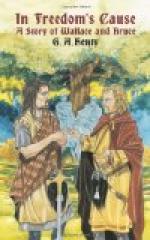The English army now marched north. Patrick, Earl of Dunbar, was with King Edward; but his wife, a noble and patriotic woman, surrendered the castle to the Scots. The Earl of Surrey, with a powerful army, sat down before it. The Scotch nobles and people marched in great numbers, but with little order and discipline, to raise the siege. They were met by Surrey, whose force, inured to arms, easily routed the Scotch gathering, no fewer than 10,000 being killed in the conflict and retreat. The English army was joined by 15,000 Welsh and 30,000 from Ireland, and marched through Scotland, the castles and towns opening their gates to Edward as he came, and the nobles, headed by James the Stewart, coming in and doing homage to him. Baliol was forced to appear in the churchyard of Strath-Cathro, near Montrose, arrayed in regal robes, and to resign his kingdom to the Bishop of Durham as Edward’s representative, and to repeat the act a few days afterwards at Brechin in presence of the king himself. He was then, with his son, sent a prisoner to London, where they were confined in the Tower for several years. From Brechin Edward marched through the whole of Scotland, visiting all the principal towns. He had now dropped the title of Lord Paramount of Scotland, the country being considered as virtually part of England. Garrisons were placed in every stronghold in the country, and many new castles were raised to dominate the people. The public documents were all carried away to England, the great seal broken in pieces, and the stone of Scone — upon which, for five hundred years, every Scotch monarch had been crowned — was carried away to Westminster, where it has ever since formed the seat of the thrones upon which English monarchs have been crowned.
The tide of war had not passed near Glen Cairn; but the excitement, as from time to time the news came of stirring events, was very great. The tidings of the massacre of Berwick filled all with consternation and grief. Some of the men quitted their homes and fought at Dunbar, and fully half of these never returned; but great as was the humiliation and grief at the reverses which had befallen the Scotch arms, the feeling was even deeper and more bitter at the readiness with which the whole of the Scotch nobles flocked in to make their peace with King Edward.




